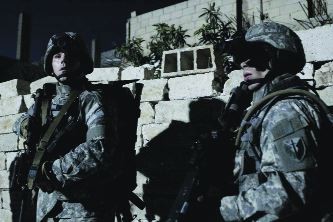Wartime truths

It takes a long while to assimilate Brian De Palma’s Iraq war film. It’s not so much that Redacted is raw and assaultive. It’s that the style isn’t like anything you’ve ever seen. It might be called a docudrama except that instead of emulating the reportage of a photojournalist, De Palma cuts between a variety of unfiltered narrative modes to tell about the rape of an Iraqi girl and the murder of her and her family by U.S. soldiers. (Though fictionalized, the film is based on an actual incident that took place in March 2006.)
Much of the movie is presented as part of a film being assembled by one of the soldiers (Izzy Diaz). Other parts are in the form of coverage by Iraqi and European reporters, including an embedded journalist who comes along on the initial invasion of the girl’s home. Other sections come from a surveillance camera set up outside the soldiers’ camp, and still other footage is from a hidden camera that is transferring images to a computer that belongs to an unseen terrorist.
The movie is more or less a retelling of De Palma’s masterpiece, Casualties of War (1989), with the setting shifted from Vietnam to Iraq. The impetus for invading the girl’s home echoes a scene in Casualties: the soldiers are responding to a bomb that hit their patrol. For three decades De Palma has been obsessed with the theme of a helpless woman and the effect her plight has on a man who is unable to rescue her—in this case a soldier named Lawyer McCoy (Rob Devaney), who carries his horror home with him after he’s completed his tour of duty.
Otherwise, the film has none of the expected elements of a De Palma movie—none of the elegant, often playful camerawork, the operatic scale or the poisoned romanticism. Perhaps De Palma didn’t think these elements could convey his outrage at the war, which is obvious in every scene, or perhaps he’s reached a dead end with that style. In any case, the digital, mixed-source visuals are scrambled and rough, their restless, uneven rhythms unfamiliar and sometimes (deliberately) perplexing. The film is superbly assembled and as powerful as an open-handed slap across the face. It doesn’t allow even a momentary refuge for aesthetic admiration.
Of course, the patchwork approach is not just the style of the movie but the subject: it’s about how images and events are perceived and how perception determines what they mean. De Palma shows us footage of soldiers firing on a car that careens through a checkpoint—from the viewpoint of the driver, whose motives we don’t know—and then cuts to an Iraqi news channel interviewing the driver, who was trying to get his wife to the hospital because she’d gone into labor. Then the film returns to the soldier, Reno Flake (Patrick Carroll), whose gunshot killed the wife and who claims he was only doing his job and feels no remorse. The film is not simply making a case against Flake. It is also showing how Flake’s training determines his reading of the situation (a local who refuses to stop at the checkpoint is assumed to be a terrorist) as well as desensitizes him to the consequences of his actions. Since Flake is possibly a sociopath, what happens to him in Iraq may be a case of a disturbed man finding in war a haven for his own tendencies.
The element in Redacted that’s hardest to take is the untutored, improvised acting. De Palma encouraged the cast, especially Carroll and Daniel Stewart Sherman as Flake’s inseparable buddy, B. B. Rush, to draw on the hip-ironic frat-boy style endemic to young men all over the country. This demeanor has special meaning in a wartime context, where emotional detachment is probably a necessity for maintaining sanity, but it’s a liability in the arena of moral engagement. The approach is undeniably effective here, but one misses the nuances of trained actors. Interestingly, in only one scene do we feel we’re watching “real” acting: when the girl’s father speaks to an Iraqi reporter about his slaughtered family. It’s as though De Palma was so moved by the unfettered grief of this character that he directed it straight on. Redacted is remarkable, but it’s not an experiment you want De Palma to repeat.




